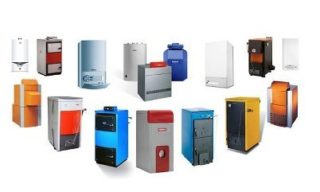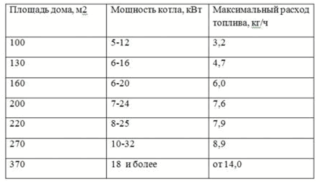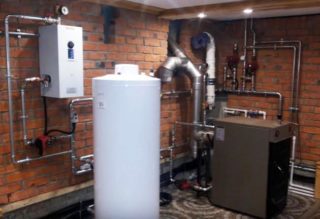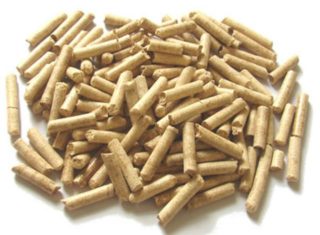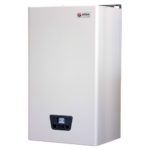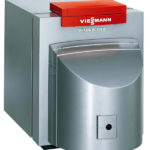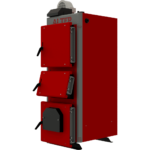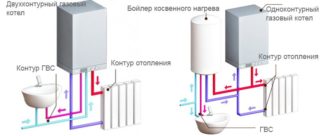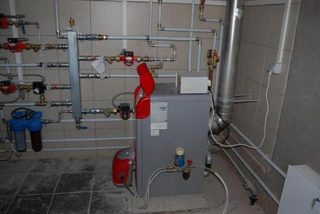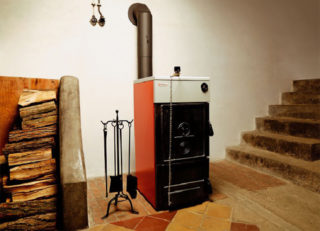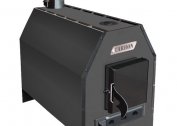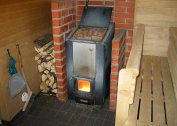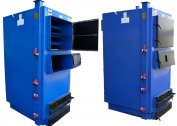To heat personal homes and supply them with hot water, it is important to learn how to choose a boiler for heating for a private house, which allows you to use it offline. To do this, you need to deal with existing varieties of units of this class, as well as with all the subtleties of their operation. Before buying equipment suitable for specific conditions, it is advisable to study the main characteristics of these products, on the basis of which it will be much easier to choose the right sample.
Key selection criteria
There are many models of heating boilers in the house of the most various class on the market. By the type of fuel used during operation, they are divided into the following types:
- solid fuel boilers for the home: on wood, peat, pellets or coal;
- units that use liquid fuel in their work: diesel fuel, for example;
- gas boilers;
- electric heating devices that allow you to do without fuel;
- universal products that run on gas or pellets or consume firewood and electricity.
Before choosing the appropriate option, you should carefully study the list of energy carriers and decide which ones are more suitable for specific operating conditions.
It is necessary to determine how good the boiler is in terms of operational safety, as well as comfort when handling it. When choosing a unit suitable for personal needs, you will need to consider the following nuances:
- thoroughly deal with the advantages and disadvantages of each of the presented samples;
- determine the optimal power for heating equipment and the number of circuits for specific conditions;
- choose a place in the house where you can put the purchased equipment.
The permissible dimensions and weight of the purchased sample depend on the last factor.
For small premises in a country house, choosing a heavy cast-iron unit is not practical.
Power calculation procedure
The desire to save on buying a heating system of suitable energy intensity, as a rule, results in even greater costs. Avoiding troubles will help seeking help from professionals who can correctly calculate the required capacity of a heating boiler for a private house and its other parameters. This approach will cost the user much less.
The power of boiler equipment is selected based on its consumption of 0.1 kW per unit of living space.
To approximate its calculation, you can use the practically obtained standards, the introduction of which took into account the following factors.
- the number of residents living in the house;
- type of material used in the construction of the building;
- climatic zone in which it is located;
- total number of windows and doors;
- number of storeys of the building.
Due to the use of modern insulation materials and the correct selection of heating equipment, heat losses in some cases can be reduced to a minimum.
Boiler Features
Well-known models of boilers for home heating differ in design, cost and fuel used during operation. Their characteristics are directly related to the type of energy carrier.
Solid fuel boilers
According to a long-established tradition, solid fuel is considered the most affordable and cheapest of all possible, which explains its great popularity.
In solid fuel boilers, it is allowed to burn only the type of energy source for which they are designed. This can be firewood, sliced peat or chopped coal, but not the remnants of unnecessary garbage. The advantages of these types of equipment include:
- full autonomy;
- low cost of energy;
- quite high efficiency (COP).
The only inconvenience that cannot be avoided when working with such boilers is the need to add fuel all the time. Only in this way is it possible to ensure a long and efficient operation.
Features of pellet boilers
Typical wood pellets called “pellets” are wood processing wastes compressed into a small cylinder. They form under a pressure of 300 atmospheres. Their sizes are 6-10 mm in diameter and 10-30 mm in length. The essence of the pellet boiler is to load them into the furnace from a small attached hopper equipped with a screw feed mechanism.
The fuel stored in such a tank is usually enough to heat the house for several days. The efficiency of solid fuel boilers is slightly higher than the same indicator for pyrolysis equipment. The relative disadvantages of this type of fuel include its rapid burning and high cost.
Oil, gas and electric boilers
Liquid fuel boilers are known as simple, reliable and economical diesel fuel designs. But they, like any equipment with an open burner, have many disadvantages, including noise operation, unpleasant odor and high fire hazard. Therefore, many users prefer gas units, which also save on the cost of the fuel itself.
Electric boilers are usually selected as a temporary measure - they are used until a gas main is brought to the suburban area. In all other cases, their acquisition is considered impractical, since the cost of electricity is only growing from year to year.
Universal boilers
Some boilers are able to operate immediately on two types of energy. Such aggregates are called universal or combined. Their main advantage is the ability to choose the type of fuel at the discretion of the user.
The versatility of heating equipment is manifested in its device, which affects the cost. But all the costs of the purchase quickly pay off with those advantages that are difficult for the user to refuse over time.
- Gas
- Liquid fuel
- Universal
Features of single and double circuit boilers
When choosing the type of boiler equipment, due attention is paid to its characteristics regarding performance and efficiency. They can be increased by increasing the number of contours in the structure. Single-circuit models are intended either only for hot water supply, or exclusively for heating residential premises in an apartment.
Both functions can be combined by installing two single-circuit boilers or installing an additional boiler, but this approach involves a significant increase in costs.
It is easier to install one dual-circuit unit, the cost of which is only slightly higher than the price of devices with one circuit. Its feature is the possibility of simultaneous use as a heating device and a water heating device (boiler).
Place selection
Most of the images of heating boilers are available in floor-mounted design, which requires a separate room - a boiler room for their placement. Manufacturers of equipment take this into account and when designing provide for the installation of reliable cast-iron heat exchangers in the unit.
Unlike floor models, their wall-mounted counterparts are characterized by compact size and relatively low weight. However, these equipment samples are limited in power, which is especially noticeable in dual-circuit systems.
Regardless of the size of the home, many users prefer outdoor models equipped with a cast-iron heat exchanger. This is because they are less demanding on the quality of power supply.
Subtleties of using boilers
For normal operation, most of the models considered need electricity. An exception to the rule is solid fuel heating units that burn coal or firewood in their firebox. However, electricity is still necessary for the automation to operate and the pumps included in the structure to function properly. A good solution in this case is the acquisition of an electric generator. Such a solution is especially relevant for those Russian regions where power outages often occur. In addition, before buying a boiler suitable for the stated purpose, users in most cases are concerned about the safety of its operation.
The presence of such protective functions is desirable:
- flame sensor;
- traction sensor;
- work blocker when lowering the pressure in the gas pipeline and reducing the fuel supply;
- overheat protection system.
All of the listed methods and means of protection - this is the minimum that will allow you to protect expensive equipment from accidental breakdowns, and the housing itself from the threat of fire and fire.
